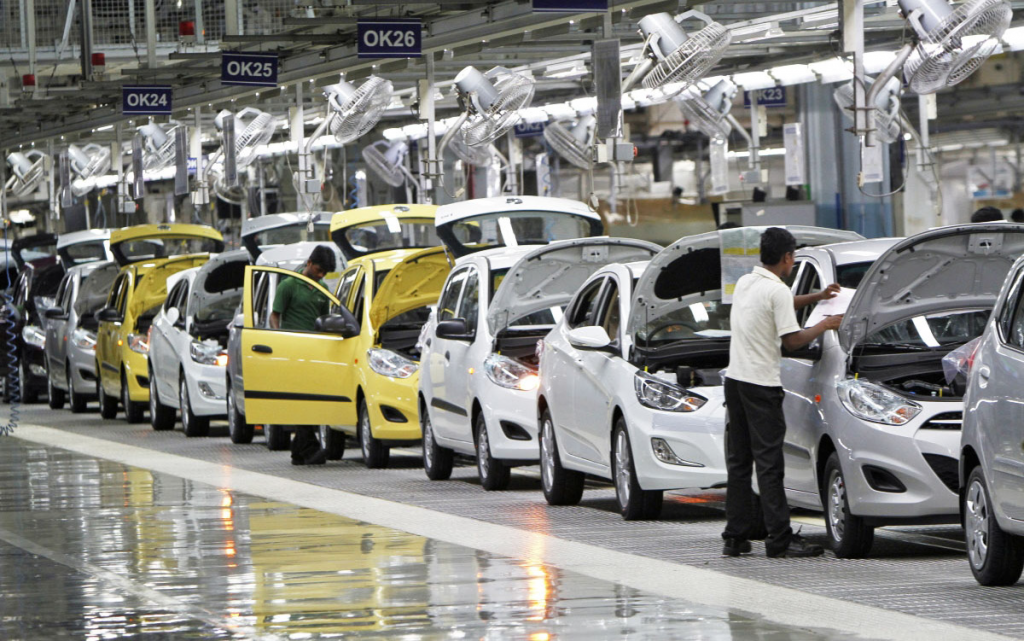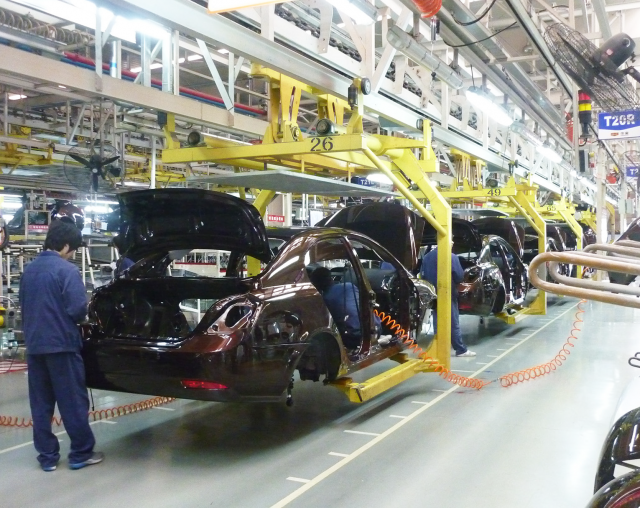Since the rapid growth of automobile after the market opening in 2011, Myanmar has been encouraging the development of automobile assembly industry, allowing auto manufacturers to import products that are essential to make vehicles in the country, according to reports.
Automotive industry is comprised of a wide range of companies and organizations that involved in the design, development, manufacturing, marketing, and selling of motor vehicles. It is said to be one of the world’s largest economic sectors by revenue and Myanmar’s automotive industry is set to grow.
In 2018 November, the Ministry of Industry launched a new automotive policy for 2019, which aimed to support the transport and auto-related business through sustainable development and more foreign direct investments.
Under the new policy, it is stated that only the vehicles with left-hand drive can be imported for the purposes of road safety and to suit the country’s traffic route direction, according to an announcement of the Supervisory Committee for Motor Vehicles Importation. Control measures on imports of used right-hand drive vehicles, which dominated the market, will would also be implemented.
So, the new policy is expected to drive further growth in domestic automotive manufacturing and auto-related businesses along the supply chain, such as machinery and parts manufacturing, supply of raw materials, after-sales services, parts distribution and insurance and financing services providers. It will also generate many employment opportunities, Yi Yi Kyaw, the general manager of No.1 Heavy Industrial Enterprise under the Ministry of Industry said.
International motor companies such as British brand Jaguar Land Rover and Roll Royce started entering in Myanmar as the country continues to open its doors to foreign investment. In addition to factors such as the relaxing of foreign investment rules and the passing of the new foreign investment law, the landscape of the automobile industry is experiencing a major overhaul.
According to Myanmar Times, the number of vehicles used in Myanmar had spiked since the authorities liberalized vehicle imports in 2012. Now, automakers estimate that the number of vehicles used in Myanmar will exceed two million in 2020, more than doubling from 721,324 in 2016, or 15 units per 1000 people. More than half the number of vehicles is in Yangon. In 2011, there were only 365,000 vehicles on the road.

According to the statement of British Chamber of Commerce, 90% of used vehicles are imported from Japan and the number of new international branded vehicles on the road is increasing due to the ease of purchase from local automotive authorized dealers
Automobile Market
The majority of car sales centers in Myanmar are owned by locals, though 100% foreign investment is allowed in the auto industry. Among the total of over 100 sales centers in Yangon, more than 90% are owned by Myanmar nationals.
With less than 100,000 passenger cars and 30,000 commercial vehicles sold in Myanmar in a year, on average, it would be quite a challenging for the the industry to experience a ban on Yangon licenses, unstable car import policies and tax regulations, along with increasing office and land rental fees. Limited resources may also hinder the growth of Myanmar’s automotive industry.
According to market survey in 2018, it was reported that most of the local people could not buy brand-new car due to high prices. So, some people opt for an installment plan in the automobile market while many still buy second-hand cars. But now in 2019, the sales figures may be better compared to the previous year.
Challenges
Even though Myanmar has potential for a boom in its automotive industry, it may take more than five years to enjoy tangible benefits in reality, according to Soe Tun, president of Myanmar Automobile Manufacturers and Distributors Association and managing director of Farmer Auto Trading.
In 2016, the Yangon Regional Government, in an effort to tackle the serious traffic congestion in Yangon, stopped issuing Yangon license in order to reduce the pace of additional numbers of vehicles on the road. In order to import a car to be driven in Yangon, you must have an existing Yangon license. However, they do issue licensees for locally manufactured and assembled vehicles.
So, it has been about three years since the authorities prohibited the issuing of licenses to vehicles registered in Yangon region. Currently, discussions are underway to relax this restriction. There are expectations that the regional government would re-allow the import of cars for its residents. Potential buyers have been waiting for the announcement.
Additionally, as the number of vehicles on the road grows, it is expected that the demand for vehicle spare parts would be rising. According to the statement of British Chamber of Commerce, 90% of used vehicles are imported from Japan and the number of new international branded vehicles on the road is increasing due to the ease of purchase from local automotive authorized dealers. This will support the market for international vehicle spare parts which is expected to grow in the coming year, allowing the growth of parts production manufacturers.

Future
According to the EuroCham Myanmar’s White Book 2019, Yangon is the market hub for automotive brands. Therefore, the competent government bodies were advised to address the issues related to the registration of imported vehicles in the city. Restrictive measures on imports, which may not be in line with the World Trade Organization (WTO), are making European brands—worldwide leaders in the automotive sector—more reluctant to invest in Myanmar. Finally, the future of the automotive industry in Myanmar should be properly discussed by involving all parties, including local associations, non-government organizations and chambers of commerce.










